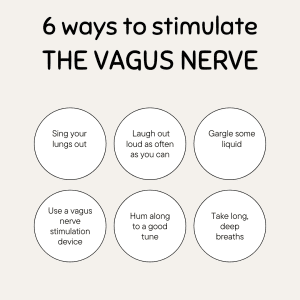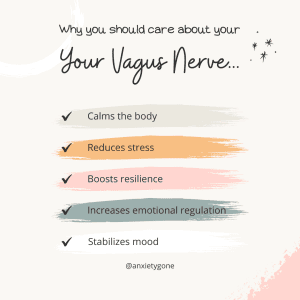Full Disclosure: Clicking on these links could mean a tiny commission for me, at no extra cost to you.
Most of us have heard of nerves that cause pain but let’s not forget about the one that helps prevent it. Your vagus nerve is a powerful part of your nervous system that influences everything from anxiety and digestion to heart rate and immune function. Yet for something so vital, it’s often overlooked in conversations about wellness and it shouldn’t be because when underactive or ignored, the vagus nerve can quietly contribute to a host of mental and physical health issues. Think chronic stress, inflammation, poor sleep, low mood and even digestive troubles. Fortunately, this is something entirely within your control. Learning how to stimulate the vagus nerve is a simple, science-backed way to support your body’s natural calming system. Whether it’s done through vagus nerve massage, breathwork, or modern vagus nerve stimulation devices, these 11 techniques are here to help you reset, recharge and reclaim your peace naturally.
What You Should Know About the Vagus Nerve
The vagus nerve (pronounced vay-gus) is the longest cranial nerve in your body, and arguably the most underrated. It runs from your brainstem down through your neck, chest, and abdomen, connecting with major organs like your heart, lungs, and digestive system. It’s also a key player in the parasympathetic nervous system, most notably, being responsible for calming your body after stress.
When functioning well, the vagus nerve helps regulate mood, inflammation, heart rate and even digestion. But when it’s sluggish or dysregulated, it can contribute to symptoms like anxiety, fatigue, brain fog and gut issues. That’s why knowing how to stimulate the vagus nerve, through massage, breathwork, movement or even targeted vagus nerve stimulation devices, can be such a powerful step toward mental and physical balance.
For a comprehensive look at what the vagus nerve is and how it contributes to your mental health, we’ve got that covered here.
How to Stimulate Your Vagus Nerve
When you use vagus nerve stimulation exercises, you can gradually shift your body out of that tense fight or flight mode and into a state of relaxation. So, let’s not waste anytime and get right to the relief.
1. Vagus Nerve Massage
Yes, you can massage a nerve, sort of. While you can’t press directly on the vagus nerve itself (it’s deep within the body), you can stimulate the areas where it travels, especially around the neck, ears and chest.
Vagus nerve massage works by activating pressure points and soothing nearby muscles that influence vagal activity, helping switch on your parasympathetic nervous system (the part responsible for rest, digestion and calm).
To try it: Gently massage the area just behind your earlobes and trace down the sides of your neck using soft, circular motions. You can also place your fingers on your chest (above the sternum) and massage outward toward your shoulders. For added relaxation, pair the massage with calming essential oils or breathe deeply while you work.
These simple massage techniques for the vagus nerve are especially helpful for easing anxiety, reducing tension headaches and resetting your stress response. It’s a small self care ritual that offers big relief.
Fast, Affordable Therapy and Medication
Medication and therapy work better together — and Hims/Hers make getting support simple. Connect with licensed providers online, receive personalized treatment plans, and access medication — all from the comfort of home. No long waits, no stress — just expert care made easy.
2. Deep Breathing
Sometimes the simplest tools are the most powerful and deep breathing is definitely one of them. By slowing down your breath and engaging your diaphragm, you send a signal to your brain that it’s safe to relax. This activates the vagus nerve and shifts your body from “fight or flight” to “rest and digest.”
Try this: Inhale through your nose for 4 seconds, hold for 4, then exhale slowly through your mouth for 6–8 seconds. Repeat for a few minutes. Known as diaphragmatic or belly breathing, this technique has been shown to stimulate the vagus nerve, lower cortisol levels and even improve heart rate variability (a key marker of vagal tone).
It’s a small habit that can have a major impact, especially when practiced regularly.
Bonus Tip: Our readers can try digital breathwork classes for free here.
3. Humming, Singing, or Chanting
Yes, your shower karaoke habit might actually be good for your nervous system. Because the vagus nerve passes through the vocal cords and inner ear, vocal vibrations from humming, singing, or chanting can stimulate it directly.
How it works: The vibration created when you hum or sing activates the muscles in the throat and voice box, subtly stimulating the vagus nerve. Chanting “om” or humming your favourite tune not only creates a soothing rhythm but also encourages deeper breathing and relaxation.
Try humming for a few minutes during your morning routine or singing along to calming music during your commute. It’s an easy, uplifting way to support vagus nerve stimulation and boost your mood in the process.
4. Gargling
It might sound a little odd but gargling is another easy and surprisingly effective way to stimulate the vagus nerve, especially the branches connected to the throat and vocal cords. It’s a simple daily practice that encourages vagal activity and helps tone the muscles involved in the parasympathetic response.
To try it: Take a sip of water and gargle deeply in your throat for 30 seconds to a minute. Aim for a strong vibration that makes your throat work (this muscle activation is what triggers vagus nerve stimulation). Some people find it helpful to do this as part of their morning or evening routine, especially after brushing their teeth.
5. Cold Water Therapy
Whether it’s taking a plunge into a cold lake or simply dipping your forehead into a bowl of cold water, cold water immersion is an excellent way to activate the vagus nerve. It can also help decrease your racing heart, which is particularly helpful during a panic attack.
Don’t worry, you don’t need to dive into an icy lake to get the benefits of cold exposure. Even brief, controlled contact with cold (like a splash of cold water on your face or a chilly rinse at the end of your shower) can stimulate the vagus nerve by triggering what’s called the “diving reflex.” This reflex slows your heart rate, calms the nervous system and helps your body reset after stress.
Try it: Start by splashing cold water on your face, especially around your eyes and cheeks. You can also apply a cold pack to your chest or the back of your neck. For the brave, finish your shower with 30 seconds of cold water. It may be uncomfortable at first, but many find it surprisingly invigorating and deeply calming afterward (it boosts dopamine too!).
This is one of the fastest natural techniques for bringing the body out of high-alert mode and into a state of calm.
6. Laughter and Social Connection
Ever notice how a good laugh or heartfelt conversation instantly lifts your mood? That’s not just your heart; it’s also your vagus nerve doing its thing. Genuine laughter and meaningful social connection are powerful activators of the vagus nerve, which is essential for regulating emotions and lowering stress.
Here’s why: The vagus nerve is closely tied to facial muscles, vocal tone, and emotional regulation. When you laugh, smile, or engage in safe, warm human interaction, you send signals of safety to your nervous system, which in turn promotes relaxation and resilience. These micro-moments of joy and bonding literally shift your body out of fight-or-flight.
Try this: Schedule regular catch-ups with friends who make you belly laugh, watch your favourite comedy or spend time with someone who makes you feel seen and safe.
7. Slow Down
Gentle, intentional practices like yoga, tai chi, or mindful walking can be great for shifting your body into a state of calm by combining physical movement with breath and presence.
Why it works:These slow, flowing movements enhance body awareness, support circulation, and regulate breathing, all of which engage the parasympathetic nervous system via the vagus nerve. Yoga poses that involve deep twists, forward folds, or diaphragmatic breathing are especially supportive.
Start small: Even a 10-minute session of mindful stretching or a quiet walk in nature can help activate your vagus nerve, reduce stress hormones, and increase your emotional resilience.
Bonus Tip: Our readers can receive a 50% discount on their yoga membership here.
8. Probiotics and Gut Health
Your brain and belly are in constant conversation, and the vagus nerve is the line that connects them. Supporting your gut health with probiotics is one of the most effective (and overlooked) ways to stimulate the vagus nerve from the inside out.
How it works: A healthy gut microbiome produces neurotransmitters like serotonin and GABA, which help regulate mood and anxiety. These signals travel directly to the brain via the vagus nerve. When your gut is out of balance, it can contribute to inflammation, low mood, and—you guessed it—vagal dysfunction.
Start simple: Add probiotic-rich foods like yogurt, kefir, kimchi, or sauerkraut to your diet. You can also consider a high-quality probiotic supplement to help restore gut balance and boost vagus nerve stimulation naturally.
Effectively Stimulate Your Vagus Nerve
Truvaga is a small but mighty handheld device that uses gentle vagus nerve stimulation to help ease anxiety, reduce stress and improve your sleep. Just 2 minutes a day, this award-winning vagus nerve stimulation device is designed to calm your nervous system — anytime, anywhere.
9. Legs Up the Wall Pose
This gentle inversion from yoga is a go-to for anxiety relief and overall vagus nerve support, especially when you need a nervous system reset after a long or stressful day.
Why it works: Elevating your legs while lying on your back helps stimulate the parasympathetic nervous system, encouraging circulation, reducing cortisol, and allowing the vagus nerve to do its calming magic. It also helps slow your heart rate, reduce tension, and improve vagal tone with very little effort.
To try it: Lie on your back and scoot your hips close to a wall. Extend your legs up the wall and rest your arms by your sides. Stay for 5–15 minutes while breathing deeply. Bonus points if you add a weighted blanket or calming music.
10. Vagus Nerve Stimulation Devices
For those who like a more tech-supported approach, vagus nerve stimulation devices offer an innovative way to tap into the calming power of this essential nerve. These non-invasive tools are designed to send gentle electrical pulses to areas like the ear or neck, areas where the vagus nerve is more accessible.
How they work: These devices aim to mimic natural vagus nerve activation, often through transcutaneous stimulation (meaning they don’t require surgery or implants). They’re backed by research, used in clinical settings, and gaining popularity among those seeking natural, medication-free support for anxiety, depression, and even chronic pain.
Popular options include ear clips, wearable devices or handheld tools you can use at home.
11. Gratitude and Journaling
Regularly practicing gratitude and journaling has been shown to reduce stress, improve emotional regulation and even enhance vagal tone over time. When you focus on what’s going well, your brain and body shift into a state of safety and connection.
How it works: Positive emotions like appreciation and joy help regulate the autonomic nervous system, signalling to the vagus nerve that you’re safe. This helps reduce anxiety, lower blood pressure, and boost overall resilience. Journaling your thoughts, feelings, or just three things you’re grateful for can create a grounding daily ritual that supports your emotional and physical well-being.
Try setting aside just 5–10 minutes each day to reflect on what’s working in your life, big or small. Pair it with a calming cup of tea, your favourite fidget ring, or a cozy blanket, and you’ve created a healing space for mind and body alike.
Resetting Your Nervous System Through Vagus Nerve Stimulation
The vagus nerve may work behind the scenes, but its impact on your mental and physical health is anything but subtle. From deep breathing and cold splashes to probiotic-rich foods and gentle movement, learning how to stimulate the vagus nerve gives you access to a powerful, natural form of anxiety relief, right at your fingertips. Whether you lean into daily rituals like journaling and yoga, or explore tech-forward options like a vagus nerve stimulation device, every small action helps bring your nervous system back into balance. One step at a time.
Additional Resources
At Anxiety Gone, we believe in healing together. We’ve partnered with trusted wellness organizations to bring you the most effective tools, insights, and support. Some links may earn us a commission — always at no extra cost to you.
Join The Club
Connect with our private self-care community for daily support, exclusive tips, and inspiration. Join us today
Talk Therapy
Get matched with licensed therapists online through BetterHelp and begin your healing today. Start now
Hims/Hers
Receive personalized, affordable mental health care + medication from home — no insurance required. Learn more
Mental Health, Right to your Inbox
Subscribe to our newsletter for a place to rest your mental health and find ways to support your journey. Sign up
Emotional Freedom Technique
Tap your way to calm with scientifically backed stress relief. Our readers receive a 14-day free trial! Try EFT now
Mindfulness App
Access 2,000+ guided practices to support your mental health wherever you are + exclusive discount when you upgrade Try it
Online Breathwork
Experience calm and reset your nervous system with guided sessions and receive your first month free . Get started
Find a Helpline
If you need immediate support, visit our directory to find help near you. See helplines











